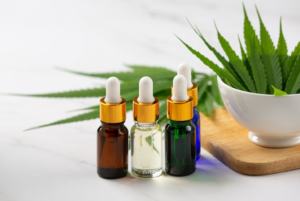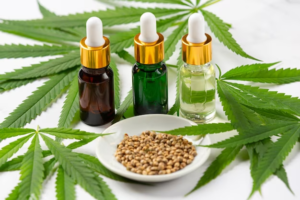
The booming cannabidiol (CBD) market has sparked widespread interest in entrepreneurship. Given the complexities involved, potential business owners often contemplate the financial prerequisites for launching a CBD venture. This comprehensive guide aims to elucidate the financial landscape of starting a CBD business, highlighting essential operational aspects and detailing potential costs for varying types of enterprises.
The Foundations of a Successful CBD Business
Understanding the fundamental components of a CBD venture ensures a streamlined approach. Every CBD business, whether a retail store or a manufacturer, necessitates meticulous planning. Factoring in the distinct financial requirements is pivotal to the success of the endeavor.
Financial Implications of Diverse CBD Ventures
While core operations like retailing or manufacturing are dominant in the CBD sector, a plethora of auxiliary service offerings have emerged. These range from CBD-centric web development to payment processing. Recognizing the nuances in the financial needs of each type aids in effective planning. Notably, each variant presents unique costs, ongoing expenditures, and operational facets.
Crafting a Persuasive Business Plan
A robust business plan serves as the blueprint for your venture. It should encapsulate your product or service, target demographic, organizational structure, and overarching objectives. As these elements crystallize, refining your plan is essential.
The foundation of your venture rests on its structural framework. Key business structures to consider are:
- Limited Liability Company (LLC): This provides owners with liability protection and advantageous taxation alternatives.
- S Corporation (S Corp): Enables income “pass-through” to shareholder’s tax returns, fostering easier capital acquisition.
- Benefit Corporation (B Corp): Ideal for profit-driven ventures emphasizing social and environmental objectives.
Equity distribution within the company also warrants careful contemplation. Ownership percentages can vary widely among founders.
Due diligence in assessing a multitude of financial, personal, and regulatory considerations is imperative to pinpoint the optimal structure tailored to your unique vision.
Preliminary Budgeting and Capital Raising
Embarking on this journey requires an early start in budget formulation and resource procurement. Factors to account for include business location, inventory, operational costs, and potential supply chain hurdles. Forward planning, even years ahead, is advisable.
Investment in nascent businesses, though sometimes seen as risky, can be appealing with a compelling product proposition. Engaging in thorough groundwork increases your readiness for proactive fundraising phases.
Navigating the Complex World of Funding
CBD business financing sources abound, from personal savings and crowdfunding to angel investors and grants. As the venture grows, venture capital becomes pivotal, especially for infrastructural developments. Venture capital not only provides a temporary financial solution but also lays the groundwork for future financing pursuits.
Multiple rounds of fundraising, spanning from pre-seed to Series C funding, characterize the startup’s financial journey. Each round serves distinct purposes, with varying financial scopes.
For instance:
- Pre-seed finances enable foundational steps like hiring and product development. Investments can range from $100,000 to $1 million, contingent on numerous factors.
- Angel investors typically provide funds ranging from several thousand to around $500,000.
- Accelerator programs come into play post-pre-seed funding, offering mentorship, education, and networking opportunities.
Subsequent rounds, like Series D and beyond, cater to advanced scaling requirements.
Crafting a Captivating Pitch
A compelling pitch is instrumental in garnering investor interest. It should succinctly encapsulate your product, problem-solution proposition, target market, revenue projections, and marketing strategies. Enriching your pitch with visual aids can amplify its appeal.
Seeking the expertise of a business advisor, especially one well-versed in CBD business dynamics, can enhance your fundraising strategy. Affiliating with professional entities like Arview Group and Mindvest can further illuminate the fundraising realm.
Choosing an Optimal Business Locale
The business location, be it a physical storefront or e-commerce platform, plays a pivotal role in your venture’s success. An adept web designer, familiar with the CBD domain, can be invaluable for online businesses, ensuring adherence to regulatory nuances.
Staying Abreast with Market Dynamics
Market vigilance ensures competitive sustainability. Tools like SWOT analysis offer invaluable insights into your business positioning. Regular competitor scrutiny and networking with local business chambers can refine your strategy. Moreover, staying updated with evolving CBD regulations is imperative.

Sales Strategy Formulation
Developing a successful sales strategy for your CBD business is paramount in today’s competitive market. Before entering the market, ensure that you possess comprehensive knowledge about your target audience. Understand their needs, preferences, and pain points, which will aid in tailoring products that cater specifically to them.
- Market Research: Dive into primary and secondary research. Attend CBD industry conferences, conduct surveys, and engage with potential customers on online forums. Gathering firsthand information can provide invaluable insights.
- Positioning: Your brand’s position in the market is vital. How do you wish your customers to perceive you? Whether you emphasize organic sourcing, third-party testing, or unique formulations, make sure your Unique Selling Proposition (USP) sets you apart.
- Pricing Strategy: Pricing isn’t just about covering costs and making a profit. It reflects your brand’s value and positioning. Opt for a penetration strategy, offering lower prices initially to gain market share, or a skimming strategy, starting with high prices to target a niche, premium audience.
- Distribution Channels: Decide whether you want to open a physical store, sell online, or adopt a hybrid model. Each comes with its own set of challenges and opportunities.
- Promotional Techniques: Implement a mix of digital marketing strategies, including content marketing, pay-per-click advertising, and social media promotions. Regularly evaluate the effectiveness of these strategies and adjust accordingly.
Ensuring Regulatory Adherence
In the ever-evolving CBD industry, regulatory adherence cannot be overstated. As the industry emerges from the shadows and enters the mainstream, regulations are constantly changing, and businesses need to stay updated.
- Constant Vigilance: Assign a dedicated team or individual to monitor changes in local, state, and federal regulations. This proactive approach can save potential legal hassles in the future.
- Training: Conduct regular training sessions for your staff, ensuring that everyone is updated with the latest regulations, especially those in customer-facing roles.
- Documentation: Maintain detailed records of all business operations, including sourcing, manufacturing, sales, and customer interactions. In case of any regulatory scrutiny, having comprehensive documentation can be a savior.
- Legal Counsel: Hire or consult with legal experts specialized in the CBD industry. Their insights can be invaluable in navigating the complex regulatory landscape.
- Compliance Audits: Periodically, undertake compliance audits to identify potential areas of risk. Address any discrepancies immediately.
Product Quality Assurance
For a CBD business, maintaining product quality isn’t just about gaining customer trust; it’s also about regulatory adherence.
- Third-Party Testing: Before releasing any product batch into the market, get it tested by reputed third-party labs. Share these reports transparently with your customers.
- Supply Chain Transparency: Ensure that your suppliers follow good manufacturing practices. It’s crucial to source high-quality raw materials, be it hemp or other ingredients.
- Feedback Mechanism: Have a robust system in place to gather customer feedback. Any complaints regarding product quality should be addressed promptly.
- Storage and Handling: Ensure that products are stored under recommended conditions to maintain their efficacy. Staff should be trained on proper handling techniques to avoid contamination.
- Continual Improvement: Invest in research and development. The CBD industry is still in its infancy, and there’s much to learn. Regularly revisit your formulations and processes, aiming for consistent improvement.
The Nuances of Market Analysis in the CBD Business
Gaining a competitive edge in the CBD industry requires more than just passion; it demands an in-depth understanding of market dynamics. This knowledge is derived from rigorous market analysis.
Understanding Consumer Demographics
Before you embark on your CBD business journey, it’s crucial to comprehend who your potential consumers are. The CBD market caters to various demographics, from millennials seeking anxiety relief to senior citizens targeting pain alleviation.
- Segmentation: Divide your market into segments based on age, geography, buying habits, and more. For instance, younger consumers might be more interested in CBD-infused beverages, while older demographics might lean toward topical creams or tinctures.
Market Size and Forecasting
Understanding the current market size and predicting its future trajectory helps in strategic planning. It aids in determining whether the market is saturated or still ripe for new entrants.
- Tools and Techniques: Utilize tools like Market Research Reports, Industry Publications, and Data Analytics software to gather insights. Estimating the Compound Annual Growth Rate (CAGR) can provide a clear picture of how rapidly the CBD market is expanding.
Competitive Analysis
Scoping out the competition is not about imitation, but innovation.
- SWOT Analysis: Strengths, Weaknesses, Opportunities, and Threats (SWOT) Analysis allows businesses to gauge their standing in the market vis-à-vis competitors. Understand what differentiates your competitors, and find gaps in the market that your product or service can fill.
- Product Differentiation: In a bustling market like CBD, having a unique selling proposition (USP) is pivotal. It could be anything from a unique extraction method, exclusive product formulations, or unmatched customer service.
Legal Landscape
As aforementioned, the CBD industry is heavily regulated. However, these regulations aren’t static; they evolve with the industry’s growth.
- Local Vs. Federal: Regulations might vary drastically between local and federal jurisdictions. For instance, while the federal government might allow the sale of CBD, certain states or localities might have restrictions.
- Lobbying: A proactive approach is not just adhering to the rules but also partaking in their formulation. Engaging in industry groups that lobby for favorable regulations can shape the future of the industry.
Understanding Supply Chain Dynamics
The CBD business is not limited to just production or retailing; there’s an entire supply chain behind the scenes. Grasping these dynamics can significantly optimize operations and costs.
- Vendor Relationships: Establishing strong relationships with suppliers ensures a consistent quality of raw materials. Regularly audit these vendors for quality assurance.
- Inventory Management: Overstocking might lead to perishable goods getting wasted, while understocking can result in missed sales opportunities. Implement inventory management software to maintain the right balance.
- Logistics: Whether it’s transporting raw hemp or delivering the final product to the consumer, efficient logistics are key. Choose reliable logistic partners who understand the delicacies of CBD products.
Digital Presence and E-commerce
In today’s digital age, having an online presence isn’t optional; it’s indispensable.
- Website Design: Your website is often the first point of contact for potential customers. Ensure it’s user-friendly, mobile-optimized, and adheres to all CBD advertising regulations.
- Search Engine Optimization (SEO): As the CBD market becomes saturated, achieving visibility on search engines like Google becomes challenging. Invest in SEO to ensure your products are easily discoverable by potential customers.
- Social Media Engagement: Platforms like Instagram, Facebook, and Twitter are not just for marketing but also for community building. Engage with your audience, address their concerns, and build brand loyalty.
The Importance of Continuous Learning
The CBD industry is in its nascent stages, and there’s much that’s still unknown. Regularly invest in research, not just for product development, but also to understand the therapeutic potential of CBD.
- Collaborative Research: Partner with academic institutions or research bodies. Joint studies can lead to breakthroughs and also enhance your brand’s credibility in the market.
- Consumer Education: An informed consumer is a loyal consumer. Regularly publish content that educates your audience about the benefits and safety of CBD. This not only positions your brand as a thought leader but also boosts trust.
The Social Impact of CBD Businesses
The increasing acceptance and legalization of CBD products worldwide have ushered in not just entrepreneurial opportunities, but also significant social impacts. Recognizing and leveraging these social implications can add a unique dimension to a CBD business.
- Community Engagement: CBD businesses can play a pivotal role in raising awareness about the benefits and safe use of CBD products. Hosting workshops, educational sessions, and community outreach programs can establish the brand as a trusted figure in the community. Beyond mere product selling, it cements the company’s image as an entity invested in the well-being of its clientele.
- Job Creation: The CBD industry has been a beacon of employment opportunities. From cultivation to marketing, every aspect of the business requires skilled and unskilled labor. CBD ventures, therefore, significantly contribute to local economies by offering jobs and fostering a skilled workforce through training and development.
- Environmental Sustainability: Many CBD businesses have pivoted towards sustainable cultivation and processing practices. The hemp plant, from which CBD is primarily derived, is known for its eco-friendly properties, such as soil remediation. Brands emphasizing sustainable, organic farming practices not only cater to a growing environmentally-conscious consumer base but also play a role in promoting sustainable agricultural practices.
Digital Marketing in the CBD Realm
In an age dominated by digital landscapes, the importance of crafting an impeccable online presence for your CBD business cannot be stressed enough. However, given the regulatory intricacies associated with the industry, navigating digital marketing can be challenging yet rewarding.
- Search Engine Optimization (SEO): With search engines often being the first point of contact for potential customers, optimizing your CBD website for search engines is crucial. Regularly updating your site with informative content, ensuring mobile optimization, and employing keyword strategies can significantly boost organic traffic.
- Influencer Collaborations: Partnering with influencers, especially those in the wellness and health domain, can dramatically enhance brand visibility. Given the restrictions on conventional advertisement platforms for CBD products, influencer marketing offers a workaround. It provides authentic, user-generated content and taps into an already engaged audience base.
- Social Media Strategies: While platforms like Facebook and Instagram have stringent policies against advertising CBD products, brands can still build a robust social media presence. Sharing educational content, customer testimonials, and behind-the-scenes glimpses, and engaging organically with followers can foster community and brand loyalty.
- Affiliate Marketing: This performance-based marketing strategy can be especially beneficial for CBD businesses. By partnering with affiliates – individuals or companies who promote your product in exchange for a commission on each sale they drive – you can reach broader audiences without violating platform-specific ad policies.
Conclusion
In today’s economy, the CBD industry stands out due to its rapid growth and unique market opportunities. However, with these opportunities come challenges. The cornerstone for thriving in this sector hinges on strategic planning and stringent regulatory adherence.
Formulating a sales strategy requires more than just product knowledge; it entails an understanding of the needs and preferences of the target audience. From market research to defining a unique value proposition for consumers, every phase plays a pivotal role in long-term success. Pricing, distribution, and promotion also play a critical role in meeting consumer needs and setting your business apart from competitors.
Adherence to regulations isn’t merely a necessity; it’s a paramount aspect that determines the reputation and long-term sustainability in the CBD market. In a world where statutes are in flux, proactive and attentive regard for them safeguards a business from potential legal pitfalls.
Undoubtedly, product quality serves as a reflection of the brand and its values. By ensuring superior quality and transparency at every production step, companies not only meet standards and consumer expectations but also set benchmarks for the entire industry.
In summation, success in the CBD industry is delineated by a blend of innovative marketing strategies, strict regulatory adherence, and an unwavering commitment to product excellence. These components, working in synergy, lay the foundation for flourishing and growth in this dynamic market segment.
FAQ
1. How is the CBD market distinctive compared to other markets?
The CBD market is distinct due to its rapid growth dynamics, stringent regulations, and high levels of consumer interest.
2. What are the key considerations when formulating a sales strategy for CBD?
Understanding the target audience, defining a unique selling proposition, pricing strategy, choice of distribution channels, and effective promotional methods.
3. What measures should be taken to ensure compliance with regulatory requirements?
Regular monitoring of legislative changes, conducting employee training sessions, maintaining thorough documentation, and engaging legal consultants specializing in the CBD domain.
4. How can product quality in the CBD industry be guaranteed?
Third-party testing, transparent supply chain practices, a feedback collection system from consumers, and continuous product research and development.
5. Why is product quality paramount in the CBD industry?
Product quality directly influences consumer trust, brand reputation, and ultimately, a company’s success in the market.





